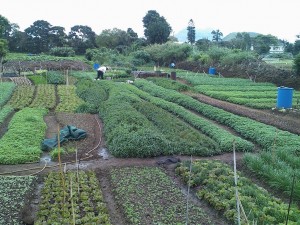 |
| A Small planter’s field in Mauritius |
Sustainable agriculture is a term and practice which is gaining a lot of momentum these days. But for many of us, it is not well-understood what it is about. Different persons in different regions have their own definition of sustainable agriculture:
Sustainable agriculture is an approach that maximises the use of natural and renewable on-farm inputs, while ensuring long-term environment stability and health benefits. It involves farming systems which are capable of maintaining their productivity and usefulness to the society on a long-term basis. Such systems must be resource-conserving, socially supportive, commercially competitive and environmentally sound.
Over the years, agricultural policies in many countries have laid emphasis on the use of external inputs to increase farm productivity and as a result, there has been an increase in the global consumption of pesticides, chemical (inorganic) fertiliser, animal feeds and agricultural machinery. Gradually pesticides have started to replace biological/cultural/mechanical control of pests, weeds & diseases, and on the other hand chemical fertilisers have substituted livestock manure, compost and nitrogen-fixing crops. Furthermore, rather than relying of traditional methods, farmers started to seek advice from input suppliers and extension services which encouraged them to use inorganic fertiliser and pesticides. As a result, these chemicals have had a negative impact on the environment.
Sustainable agriculture in Mauritius
Among the countries that have been relying heavily on agro-chemicals in their agriculture, Mauritius is also included. This practice is not only harmful to the environment, but it also has an impact on the food quality and safety. The government of Mauritius has taken note of this problem and has included strategies in its agricultural policies to encourage the practice of sustainable agriculture by the farming community. The strategies in the policy are focused on the following areas:
- Sustainable land Management
- Development of sustainable fertilisation programme
- Irrigation and Water management
- Integrated Pest Management
Sustainable Land Management
As a small island, Mauritius has limited area of land, therefore it is very important to utilise it sustainably so as to keep it productive and minimize environmental hazards. This is expected to be achieved though capacity building on sustainable land management among farmers, encourage the use of bio-fertilisers, regular assessment of land degradation and finally regular training of farmers on sustainable agricultural practices.
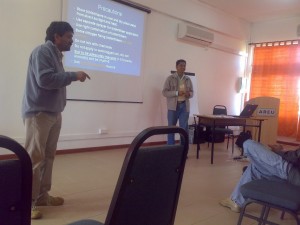 |
| Training of farmers on the use of bio-fertilisers by Extension Officers |
 |
| Mixing Biofertiliser with water for field trial |
 |
| Application of biofertiliser in carrot field (Trial) |
Development of sustainable fertilisation programme
Since current fertilization recommendations do not take into consideration the amount of nutrients that are already available in the soil from organic sources (manure, scum etc.) and crop residues, what happens very often is over-fertilisation resulting in nutrients leaching. To avoid having these problems, it is encouraged to test nutrient content of the soil and develop fertilisation programme according to the status of the soil. The use of compost and bio-fertilisers are also encouraged.
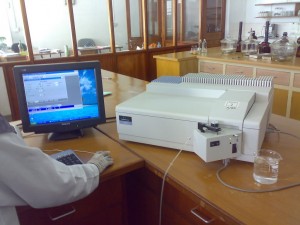 |
| Nutrient determination in the lab (Ministry of Agro-Industry and Food Security – Mauritius) |
Irrigation and Water Management
Without doubt, water is a scarce and valuable resource in agriculture. In fact, 70% of water utilisation in the world is for agriculture. As a small country, Mauritius is concerned with the impact of climate change and recently (2011) there was a drought in the country. In order to improve crop productivity while optimising the use of irrigation water and minimising risks of run-off and salinity, research in Mauritius has developed small-scale drip irrigation and fertilisation technologies. To encourage farmers to adopt this practice, a drip irrigation system/ fertigation (irrigation+fertilisation) system have been installed in model farms of the Agricultural Research and Extension Unit (AREU), where farmers can see how it works and adopt the technology. The extension service also trains them on how to manage a drip irrigation system. In addition, incentives are being provided on family drip systems for small scale farming.
 |
| Field trial on fertigation system at a Research Station (Mauritius) |
 |
| Drip Irrigation System at Flacq Model Farm (Mauritius) |
Integrated Pest Management is an effective and environment-friendly approach that is used to control pests and diseases in the field. Some of these techniques are described below:
Biological Control
Biological control of pests was introduced in Mauritius in 1762 when the Mynah bird was brought to the island from India to control Red Locusts in sugarcane fields. Over the years, many natural enemies have been brought into the country. Some were successful while others were not for various reasons. A very interesting article on alternatives to pesticides can be read HERE.
 |
| Release of Natural Enemy of Plutella Xycostella (pest) in Cauliflower field by Extension Officer |
Sterile Insect Technique (SIT)
Sterile Insect Technique (SIT) is a biotechnological control of pests. The insects are passed through certain chemicals or x-rays/gamma-rays in the lab and as a result, they become sterile. These sterile insects are reared in large numbers and released in the environment. Since they are sterile, they will not multiply when mated with the female insects. The following video (by FAO) gives a good over-view on the use of SIT to control fruit fly in Croatia:
Bio-pesticides
Bio-pesticides are being sold by input suppliers in Mauritius, but it is known to work a bit slower than inorganic pesticides. Farmers are usually trained on the benefits of using these organic products to control pests by the extension service.
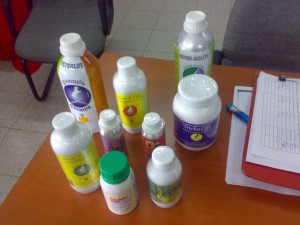 |
| Some bio-pesticides available in Mauritius |
Pheromones/baits
Melon fly is a pest that causes a lot of damage to cucumber in Mauritius. This pest was successfully controlled through IPM some years ago, from the implementation of a project in the region of Plaine Sophie (in the central part of Mauritius). Losses of up to 90% were recorded in cucumber fields in the region and the pest had become resistant to pesticides. Planters were spending a lot of money to buy pesticides and apply to their fields, but nothing was working. This project was funded by the International Agency for Atomic Energy (IAEA) and implemented by the Agricultural Research and Extension Unit (AREU) and the Entomology division of the Ministry of agro-Industry and Food Security, which included:
a) plantation of a trap crop (Maize)
It was recommended that maize is planted in the field at least 1 month before transplantation of cucurbit seedlings.
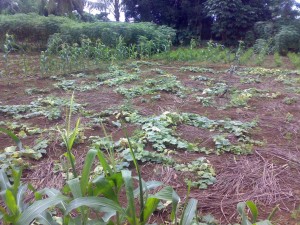 |
| Cucumber plants with maize as trap crop at Flacq Model Farm |
b) Bait Application
Two weeks after transplantation of the cucumber seedlings, it was recommended to apply a protein bait under the leaves of the trap crop.
c) Mass trapping of insects
Two weeks after transplantation, traps made of plastic bottle with openings on the sides were put in the field and the insects were trapped in numbers. These traps contained insecticides and were placed 20m apart. After 15 days, they needed to be changed.
 |
| Traps made up of plastic bottles in farmer’s field |
d) Sanitation
Along with these processes, all infested fruits were recommended to be collected and disposed by placing them in sealed plastic bags or burying them at a depth of at least 30 cm.
This project was very successful in Mauritius and farmers claimed that before implementation of these techniques, they were having 80% losses and using twice as much pesticides than it was recommended and after implementation, the losses were barely 5% without application of pesticides. This project has helped them increase their farm productivity and at the same time they have been able to reduce the cost of production by not applying pesticides.
The above are few examples of IPM and farmers who are using these practices should make sure that in the region other farmers are not applying pesticides or using agro-chemicals since for some of these techniques (biological control for example), the natural enemy will die with the chemical and the technique will not work.
Way forward
It is true that for farmers who are used to rely on agro-chemicals to increase their production and control pests and diseases, it would be very difficult for them to shift to sustainable agriculture. This is because while using agro-chemicals, the result is immediate but while using environment-friendly techniques, it may take time to work and the quality of the produce may not be that good. The important point to understand is that for today and some years to come, we can benefit from the current agricultural practice, but if we do not take actions now, there is high risk of land degradation, pests may develop resistance to chemicals and other unforeseen problems may arise. Hence, the extension service has to keep on encouraging farmers to practice sustainable agriculture and train them on the different techniques that have been validated by research.
Visited 479 times, 1 visit(s) today

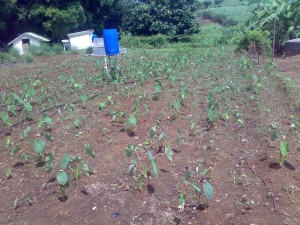
A very nice attempt while writing this blog on sustainable agriculture! 🙂 It will sure take time to change the mindset and show the worth of a sustainable system, but that’s the way forward if we want to survive.
Thanks. Presently it is not being practised by many farmers, just at research stage.. Just hoping that adoption comes pretty soon! 🙂
Nice post. I would like to get in touch with you.
Here is my email address.
Kindly, revert back.
Y.elaheebocus22@gmail.com
Wish you were my senior then I would not have lost much time to understand sustaninable development in Mauritius. Just reading this article give one an insight of this concept.
Hahah
Thanks Aniissah! I’m glad this post has been helpful to you in getting a better picture of sustainable Agriculture 🙂
Innovative rain water harvesting can take this success to a new level!
Capture, contain and solar pump to drip irrigation.
1 inch of rain on 1 acre of land produces over 27,000 gallons of fresh water. This would get them through dry periods, saturate soil and replentish ground water. Stop wasted run off and standing water.
Ease water borne illness in process.
http://www.rain-catchers.net
“The safety of people and the environment are the main investments for a sustainable future”.
You are right Prakash. And Agriculture being one of the big contributors of greenhouse gas emissions should be given more considerations in Environmental issues. Agriculture is very often left aside.
Does уоur blоg hаѵe a contact page?
I’m having trouble locating it but, I’d like tο senԁ you an е-mail.
I’ve got some creative ideas for your blog you might be interested in hearing. Either way, great site and I look forward to seeing it grow over time.
my site > Global Warming Facts
Hi. Nice post. do you have the contacts for the bio pesticides suppliers in Mauritius?
i want to start a cattle and goat farm. What are the steps involve
The value of agriculture is something many people don’t give much attention to, they just take it for grated. They expect their meals to always be on the table, but do they know where it come from? Its important people should know where delicious foods come from, and also its value for the body. Through education they would turn their backs on general processed foods, and eat more Organic foods to benefit their bodies.
Hello Nauwsheen,
I am currently an MBA student at UoN and i wish to have more insight about the sustainable agriculture….as my business project would be around this topic only. Please let know if we can get in touch.
Thank you.